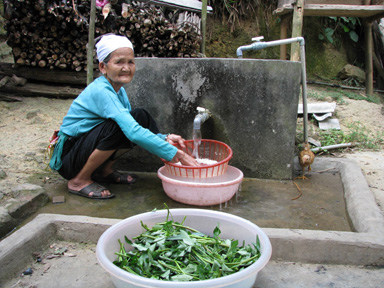Lack of Water Makes People Poor
|

Stockholm September 10 - This week thousands of water, sanitation and hygiene (WASH) experts and hundreds of members of the media came together in Stockholm for World Water Week to discuss solutions to the world WASH challenge.
David Trouba of the Water Supply and Sanitation Collaborative Council suggested that “solving the sanitation crisis would be a more momentous accomplishment for humanity than the building of the Great Wall, the Apollo Moon Missions or the construction of the Pyramids.” At present the dire fact is that 1.2 billion people have to crap in the open, polluting drinking water and causing diarrheal-disease while suffering the insecurity and indignity of open defecation. The consensus of the participants is that the world could, should and will solve this problem.
One of the specific outcomes of World Water Week was a statement by participants targeted as a wake-up call for the High Level Plenary Meeting on the Millennium Development Goals (MDGs) that will be held September 20-22. Their request is for leaders across the world to prioritize action to ensure that the MDG for water and sanitation is met. It is becoming more widely acknowledged that not meeting the MDG for WASH will undermine the achievement of other MDGs—in particular the MDG for maternal and child health. “Lack of water and sanitation makes people poor. Inadequate access to water and sanitation deprives billions of people, especially women and girls, of opportunities, dignity, safety and well being,” read the Stockholm Statement.
“Water has definitely not received the place it needs to have in the draft outcome of the summit. Good management of water resources and provision of drinking water and sanitation is a prerequisite for fulfilling all the MDGs,” said Anders Berntell, Executive Director of the Stockholm International Water Institute (SIWI).
World Water Week also included a capacity-building workshop for developing country journalists so that they can report more effectively about the water and sanitation challenge in their home countries. The 2009-2010 WASH Media Award winners were also announced during the week. Journalists came from as far as Bangladesh, Malawi, Venezuela and Yemen to participate in the workshop.
The issue of WASH in Schools was also a theme of World Water Week. A partnership among more than 25 organizations is urging decision makers across the world to increase investment in WASH in schools. 50% of school-aged children in the developing world are forced to attend a school without safe drinking water, a toilet or soap and a place to wash their hands. This partnership stresses that all children should be able to go to school and all schools should have WASH as a part of a safe, healthy and comfortable environment for learning and growing.
World Water Week is also about how to deliver WASH services effectively and sustainably. It is a practical week as much as it is a visionary and policy-oriented week. Governments, implementing organizations, the private sector and the poor themselves will have to work together to ensure that WASH services get delivered, especially for the ultra-poor and most vulnerable. This will require thinking outside the box and creating a movement for solving the WASH challenge. Some solutions will be technical such as the RainWater Bag, which could be a lower-cost and practical solution for mainstreaming rainwater harvesting, or ecological sanitation, the process of turning human poop into fertilizer. Could this so-called humanure be a new cash crop that provides an income opportunity in extremely poor communities? Other solutions will be sociological. To overcome the sanitation and hygiene challenge, billions of people will have to change their behavior. But according to the 2,600 participants of World Water Week, this is all doable.
If you are interested in meeting people that were a part of World Water Week, you can do it on WaterCube.tv.
-- John Sauer is Communications Director for Water Advocates
This blog is also available at The Huffington Post.














